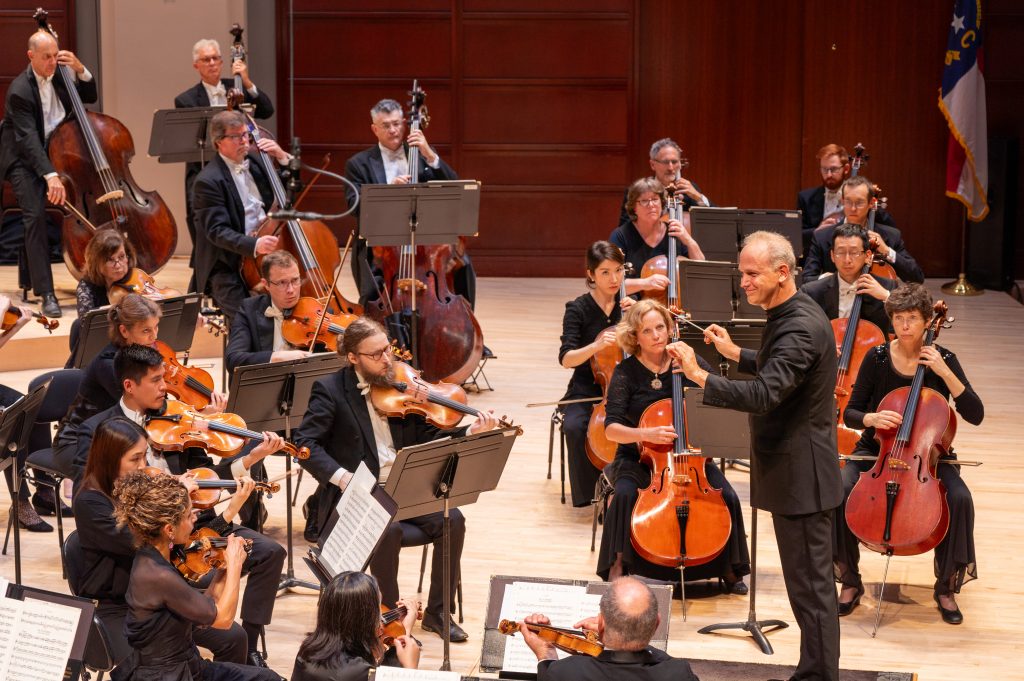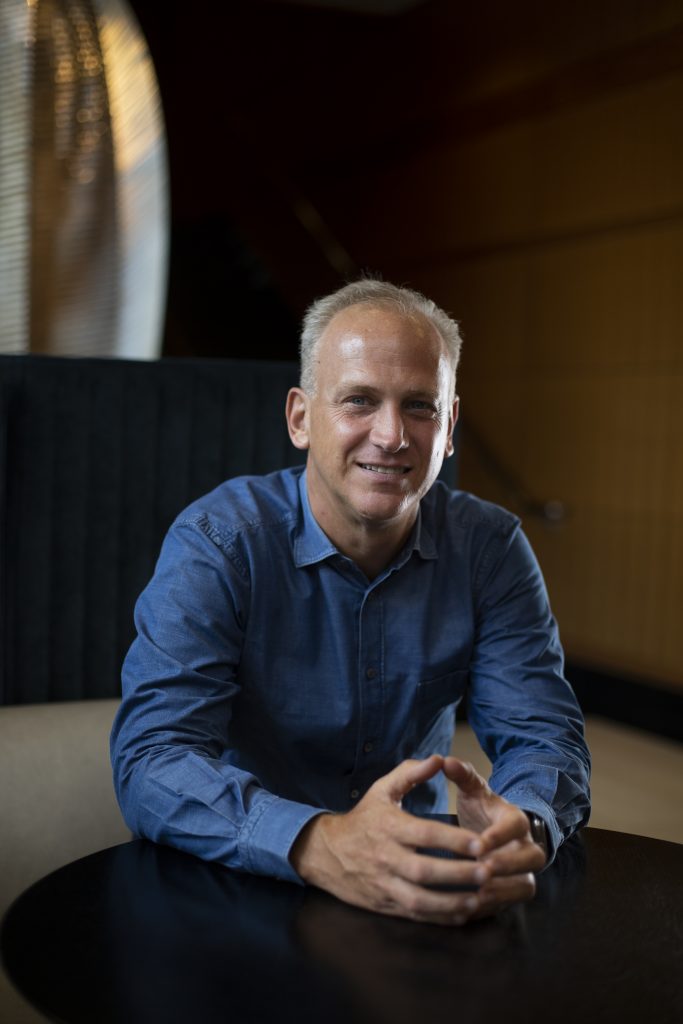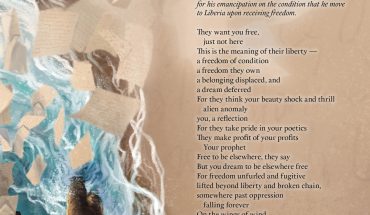The new conductor of the North Carolina Symphony plans a season that celebrates diverse musicians, music and community.
by Lori D. R. Wiggins | photography by Eamon Queeney
The North Carolina Symphony’s new musical director, Carlos Miguel Prieto, began his initial four-year term to open the 2023-24 season in September. A native of Mexico City, Prieto, 57, studied engineering at Princeton University, and lived in New Orleans as the Louisiana Philharmonic Orchestra’s music director from 2005 until starting with our symphony.
A regular guest conductor with the NC Symphony since 2011, Prieto also served as its artistic advisor before serving as music director designate last season. He also is music director of the Orquesta Sinfónica Nacional de México and the Orquesta Sinfónica de Minería, as well as principal conductor and music director of the Orchestra of the Americas, formerly Youth Orchestra of the Americas.
In 2010, Prieto won a Grammy Award for Best Instrumental Soloist(s) Performance (with orchestra). He also won a 2016 Latin Grammy Award for Best Classical Album, with Gabriela Montero and the YOA Orchestra of the Americas, and the Music America 2019 Conductor of the Year. American cellist Yo-Yo Ma once described Prieto as “a conductor for our 21st century.” Prieto grew up in a musical family that made education and social justice priorities.
His father is a cellist who still plays at 86, and his grandfather served on the board of their country’s National Symphony Orchestra, the second-oldest on the American continent. Prieto and his wife Isabel Mariscal, a former ballerina with the Mexican National Ballet, have three teenage children.
The weekend of Sept. 22, Prieto made his official musical debut in Raleigh, conducting Tchaikovsky’s Symphony No. 4. He shared the Woolner Stage with Venezuelan trumpet virtuoso Pacho Flores and Venezuelan composer Hector Molina on cuatro, a classical guitar-like Latin American string instrument. It was the North Carolina Symphony debut for both musicians.
The music was festive and upbeat, and quickly inspired a contagious energy of celebration within the audience. We sat down with Prieto to learn more about what he envisions for the state’s premier orchestra and its audience.

I understand that you have longtime ties to North Carolina! can you Tell me about them?
I went to Camp Sea Gull, a YMCA of the Triangle camp outside of New Bern, for several summers when I was growing up. My parents wanted to make sure their kids learned English in a place that was not a school that doesn’t use the language, and they looked for a place that had no Mexicans. At the time, that was New Bern. I remember being barefoot all day, so I would come back from camp with these strong feet. I remember Taco Night — but the tacos did not look or taste anything like tacos. American camps do a good job with kids. They teach values and have a strong achievement program with goals. At these camps, if you work for it, you earn your right.
You grew up in a musical family — was there an expectation you’d turn music into a profession?
My family mostly played for the love of playing music. I was good at math, so I studied engineering. My Dad was the first professional, so my family all looked at me like I lost my mind when I went back to music after studying engineering. The world of music is a very tough, competitive world. It was luck that I was able to enter the game and still make a difference.
How do you feel about music education?
I think it is essential. A child will sing before a child speaks, and react to you singing better than to you reciting words. Music resonates immediately. There were kids in New Orleans who learned to play an instrument before they learned their A, B, C’s so music has always been a part of their life. There’s imagination, the search for beauty through harmony, dedication; all these values that are universal. On every level you can look at, music is positive. An orchestra is the strongest vehicle of communication of these values: generosity, collaboration — you can produce beauty for others. Orchestras have to play a role in education in music, because they have a different kind of awareness.
What’s it like to win a Grammy Award, twice?
To me, I’m proud of what I do, but I always look at other people — my friend Jon Batiste won 14 Grammys one year!
What’s your vision for the NC Symphony?
I would like for the audience of this orchestra to be a lot more diverse and include people of all kinds and all ages. I’m not saying it isn’t, but there is potential for a lot more. Hopefully the audience will be more what the city is like in reality, the same people coming into the city should be coming into the concert hall, so the orchestra starts reflecting the community more.
What are barriers for folks coming to the symphony?
What we do is perceived as elitist. Financially elitist, socially elitist and intellectually and culturally exclusive. People say, Your tickets are expensive! But you see what people pay for sports and other concerts — one ticket to a Taylor Swift concert is a third of the subscription for one whole season with the symphony! People say, “I don’t have anything to wear,” or “I don’t want to be dressy.” I say, you don’t have to look a certain way. Just put on something and come! People say, “This is not for me. I won’t understand the music.” But to go to a hockey game, you don’t need to know how to skate on ice. Just go and experience it! Liking it is fine and hating it is fine, but not giving yourself the chance to experience it is the only thing I would question.
Your repertoire is known to highlight Latin music, new music, and music of America. How do you choose the music?
Classical music did not end 200 years ago! Shaping a season is a process of meeting and deciding on a repertoire. It’s knowing what’s available and not available, and knowing what things have worked for me. It’s a question of whether it has been done before, or not. You learn from the individuals around you and take it from there. Already, this season is shaping in a way I like: varied geographically and culturally, filled with things the orchestra hasn’t done before, and vice versa. Little by little, you shape seasons.
What inspires you?
It’s the music itself. I get most of the inspiration from the musicians and seeing people play well and devote their energy and emotion to performance. And the audience inspires me; like, it’s seeing a little girl in the audience who has dressed up for the concert. But, mostly, it’s the music. There are people there who may have had a difficult day, or life, and maybe this is the concert that will help them or make them think about something good. You always have a message you want to communicate. We work with music that is so good, you don’t have to look for too much outside of it to motivate you.
This article originally appeared in the November 2023 issue of WALTER magazine.





